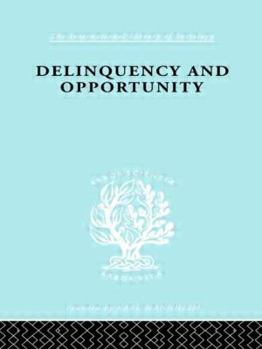Delinquency and Opportunity: A Study of Delinquent Gangs
Select Format
Select Condition 
Book Overview
First published in 1998. This is Volume VI of the twelve in the Sociology of Youth and Adolescence series and focuses on delinquent subcultures and theories around masculine identification, adolescence and lower-class culture, alienation and illegitimate means. This study is an attempt to explore two questions: (l) Why do delinquent norms, or rules of conduct, develop? (2) What are the conditions which account for the distinctive content of various systems of delinquent norms such as those prescribing violence or theft or drug-use?
Format:Paperback
Language:English
ISBN:0415510392
ISBN13:9780415510394
Release Date:December 2011
Publisher:Routledge
Length:232 Pages
Weight:0.61 lbs.
Dimensions:0.5" x 5.5" x 8.5"
Customer Reviews
1 rating
Still ahead of its time
Published by Thriftbooks.com User , 16 years ago
Delinquency and Opportunity provided the theoretical foundation for programs aimed at reducing the incidence of juvenile delinquency during the Kennedy Administration. Cloward and Ohlin hold that human beings are rational seekers of opportunity. If the only sources of opportunity are illicit ones, then juveniles will resort to illicit means, a rational thing to do. At the same time, the same delin1nquents will develop a moral code -- an enabling cultural rationale -- to legitimate their illicit activities. The simplest would be "there is no opportunity so we have no choice." "Another would be "we live in an inherently crooked social system, so why comply to norms that others routinely ignore." This is a remarkably honest, thoroughly researched, and wonderfully insightful book. It's theme is much like that of Paul Wilis' in Learning to Labor: reciprocity is essential to a stable society, It also brings to mind Schwarz's notion that no society can survive on incantations alone. A great book replete with observations that apply just as usefully today as when it was written, nearly fifty years ago.





